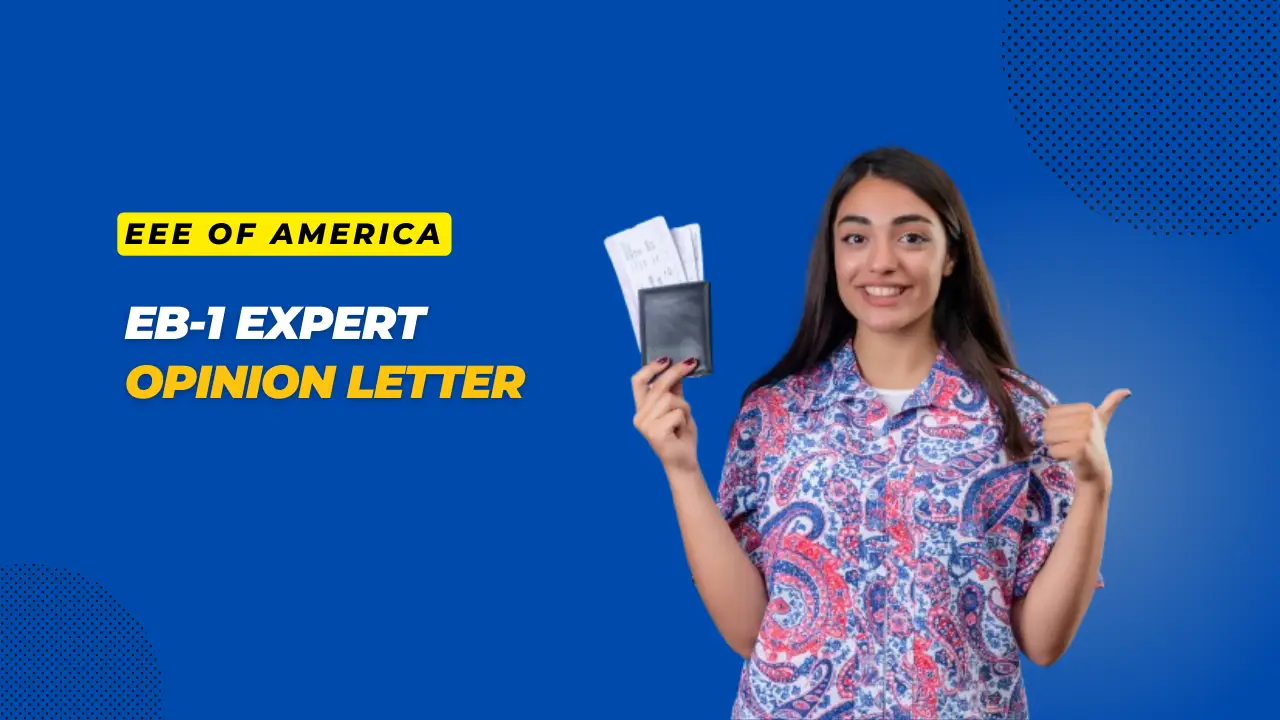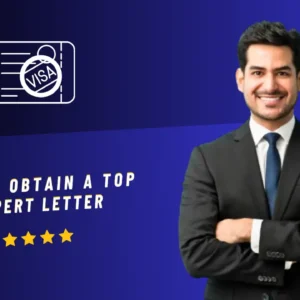Getting an EB-1 visa can feel like a rollercoaster ride—exciting but also a bit scary. There’s a ton of paperwork and rules to deal with. But guess what? There’s one thing that can make it all a lot easier: an EB-1 Expert Opinion Letter. Think of it as your secret weapon, here to help you through the visa application process with less stress and more success.
In this guide, we’re going to dive into what EB-1 Expert Opinion Letters are all about. They’re like letters of recommendation from experts in your field, saying how awesome you are at what you do. These letters aren’t just pieces of paper; they’re like magic spells that make your visa application stronger and more convincing.
So, why do you need these letters, and how do they work? Imagine them as your superheroes, swooping in to save the day by making your application shine brighter. Throughout this guide, we’ll explain everything you need to know about EB-1 Expert Opinion Letters in simple terms.
Whether you’re just starting out or you’ve hit a roadblock in your visa journey, this guide is here to help. Let’s make understanding EB-1 Expert Opinion Letters as easy as pie, so you can breeze through your visa application with confidence. Together, we’ll make sure your EB-1 visa dreams become a reality—one expert opinion letter at a time.
What are EB-1 Expert Opinion Letters?
EB-1 Expert Opinion Letters are like your visa application’s secret sauce! They’re documents written by experts in your field who can back you up and say, “Yep, this person is truly exceptional.” These letters are crucial for your EB-1 visa journey because they give your application a big boost of credibility.
So, what makes these letters so special? Well, picture this: you’re trying to prove to the visa folks that you’re outstanding in your field. You’ve got your achievements and awards lined up, but it’s always better when someone else sings your praises, right?
That’s where the expert opinion letters come in handy.
These letters are like shining endorsements from people who know their stuff. They highlight your skills, accomplishments, and the impact you’ve made in your field. Plus, they show that respected professionals are cheering you on, which can make a big difference when your application is being reviewed.
Now, who writes these letters?
It’s usually someone with serious street cred in your industry—like a professor, a colleague, or a top dog in your field. They’ll share their honest opinion about why you’re awesome and why you deserve that EB-1 visa.
They’re not something you want to skip over if you’re serious about obtaining that visa.
So, if you’re aiming for the stars with your EB-1 visa application, ensuring you have these letters on your side through EEE of America services is crucial—they could be the key to unlocking your visa dreams!
Why are EB-1 Expert Opinion Letters important?
EB-1 Expert Opinion Letters are crucial because they provide independent validation of your extraordinary abilities and achievements, serving as compelling evidence in your EB-1 visa application.
These letters offer an objective assessment from professionals in your field, highlighting your impact and contributions, thus bolstering the credibility of your petition.
In essence, EB-1 Expert Opinion Letters play a pivotal role in substantiating your claim to extraordinary talent or expertise, significantly increasing your chances of visa approval.
How do Expert Opinion Letters vary in importance between EB-1 and EB-2 visa applications?
Top 5 Agencies for Expert Opinion Letters
Embarking on the journey to obtain an EB-1 visa is both thrilling and nerve-wracking. It’s like stepping onto a path filled with possibilities but also obstacles. Amidst all the paperwork and regulations, there’s one tool that stands out as a beacon of hope: an EB-1 Expert Opinion Letter. Think of it as your secret weapon, here to help you through the visa application process with less stress and more success.
1. EEE of America
- EEE of America stands as a beacon of excellence, offering tailored Expert Opinion Letters meticulously crafted to bolster your EB-1 and EB-2 visa applications. With a reputation for personalized service and unparalleled quality, they lead the industry in unlocking visa potential.
2. FIS (Foreign Credential Evaluation Services)
- FIS specializes in providing comprehensive foreign credential evaluation services, including expertly crafted Expert Opinion Letters for EB-1 and EB-2 visa applicants. Their experienced team ensures accuracy and reliability, guiding clients through the visa process with confidence.
3. WES (World Education Services)
- WES is renowned for its expertise in evaluating international education credentials and providing support for visa applications. Their Expert Opinion Letters are tailored to highlight the academic achievements and qualifications of EB-1 and EB-2 visa candidates, facilitating their journey to permanent residency.
4. GEO Credential Services
- GEO Credential Services offers a wide range of credential evaluation solutions, including Expert Opinion Letters tailored to meet the specific requirements of EB-1 and EB-2 visa applicants. With a focus on integrity and professionalism, they help clients navigate the visa process with ease.
5. Proval
- Proval specializes in providing expert opinion letters designed to strengthen EB-1 and EB-2 visa petitions. With a team of seasoned professionals, they offer personalized service and meticulous attention to detail, ensuring their clients’ applications stand out among the rest.
Apply for an EB-1 Recommendation Letter from EEE of America
Here’s a simple guide on how to get an EB-1 recommendation letter from EEE of America:
- Contact EEE of America: Reach out to EEE of America via email or phone to express your interest in obtaining an EB-1 recommendation letter.
- Initial Consultation: Schedule a consultation with EEE of America’s team to discuss your qualifications and the specific requirements of your EB-1 visa application.
- Document Submission: Provide EEE of America with relevant documents, such as your CV/resume, academic transcripts, awards, publications, and other evidence of your achievements.
- Expert Assessment: EEE of America’s experts will review your documents and assess your qualifications to determine the best approach for crafting your recommendation letter.
- Letter Drafting: EEE of America will draft a customized EB-1 recommendation letter highlighting your exceptional talents and contributions in your field.
- Review and Revision: You’ll have the chance to review the draft letter and provide feedback. EEE of America will make any necessary revisions to ensure accuracy.
- Finalization: Once you’re satisfied, EEE of America will finalize the recommendation letter and provide you with the completed document.
- Submission: Include the EB-1 recommendation letter from EEE of America in your visa application package and submit it to the immigration authorities.
- Follow-Up: Stay in touch with EEE of America for any additional support or guidance throughout the EB-1 visa application process.
Common Challenges: EB-1 Recommendation Letters and Visa Application
Here are common challenges specifically related to obtaining EB-1 recommendation letters and the EB-1 visa application process:
Challenges for EB-1 Recommendation Letters:
1. Identifying Suitable Recommenders:
– Finding experts in your field who are willing to write persuasive and detailed recommendation letters can be challenging, especially if you lack strong professional connections or recognition.
2. Ensuring Credibility and Authority:
– Convincing USCIS officials of the credibility and authority of the recommenders can be difficult, particularly if the recommenders are not well-known or respected within your industry.
3. Obtaining Timely Responses:
– Securing recommendation letters within the required timeframe can be challenging, especially if the recommenders are busy or have competing priorities.
4. Balancing Quantity and Quality:
– Striking the right balance between obtaining multiple recommendation letters and ensuring each letter is of high quality and relevance to your EB-1 application can be a delicate task.
5. Coordinating Content and Messaging:
– Coordinating the content and messaging of recommendation letters to align with your EB-1 visa application and showcase your extraordinary abilities effectively can be challenging, especially if recommenders have differing perspectives or writing styles.
Challenges for EB-1 Visa Application:
1. Proving Extraordinary Ability:
– Demonstrating extraordinary ability and sustained national or international acclaim in your field can be challenging, requiring extensive evidence of achievements, recognition, and impact.
2. Navigating USCIS Requirements:
– Understanding and fulfilling the complex requirements set forth by USCIS for the EB-1 visa category, including criteria for each subcategory (extraordinary ability, outstanding professors/researchers, multinational managers/executives), can be daunting.
3. Document Authentication and Translation:
– Ensuring that all supporting documents, including recommendation letters, academic credentials, awards, and publications, are properly authenticated and translated into English can be time-consuming and costly.
4. Responding to Requests for Evidence (RFEs):
– If USCIS issues a Request for Evidence (RFE) seeking additional information or documentation to support your EB-1 visa application, responding effectively and comprehensively can be challenging and may require legal assistance.
5. Meeting Strict Timelines:
– EB-1 visa applications are subject to strict deadlines, and delays in document preparation, processing, or response to USCIS requests can jeopardize the timely submission and approval of the application.
6. Financial Considerations:
– Affording the costs associated with the EB-1 visa application process, including USCIS filing fees, attorney fees, document authentication fees, and translation costs, can pose a financial burden for some applicants.
7. Maintaining Legal Status During Processing:
– Applicants who are already in the United States on a non-immigrant visa must ensure they maintain legal status throughout the EB-1 visa application process to avoid potential complications or visa violations.
8. Complexity of Immigration Laws:
– Navigating the intricate landscape of U.S. immigration laws and regulations pertaining to the EB-1 visa category can be challenging, particularly for individuals without legal expertise or experience in immigration matters.
By being aware of these common challenges and seeking appropriate assistance and support, applicants can better navigate the EB-1 recommendation letter process and the overall EB-1 visa application journey.
FAQs
Q: How can I obtain a recommendation letter for EB-1?
A: To acquire a recommendation letter for EB-1, identify reputable experts in your field who can attest to your extraordinary abilities or achievements. Approach them with a clear request outlining your accomplishments and the specific criteria for the EB-1 category you’re applying under. Provide supporting documentation to assist them in crafting a compelling recommendation letter.
Q: What exactly is an expert opinion letter?
A: An expert opinion letter is a document written by a qualified expert in a particular field, providing an assessment or evaluation of an individual’s abilities, achievements, or qualifications. In the context of visa applications like EB-1, expert opinion letters are used to support the applicant’s case by providing independent validation of their extraordinary abilities or achievements.
Q: What is the typical success rate of EB-1 appeals?
A: The success rate of EB-1 appeals can vary depending on various factors, including the strength of the applicant’s case, the quality of supporting documentation, and the expertise of legal representation. While there’s no definitive success rate, applicants who thoroughly prepare their cases and address any deficiencies identified in the initial petition stand a better chance of success in the appeal process.
Q: How many recommendation letters are typically needed for EB1B?
A: For the EB1B (Outstanding Researchers/Professors) category, USCIS does not specify a specific number of recommendation letters required. However, it’s generally recommended to provide at least three strong recommendation letters from reputable experts in your field. These letters should highlight your outstanding achievements, contributions to your field, and recognition by peers.




